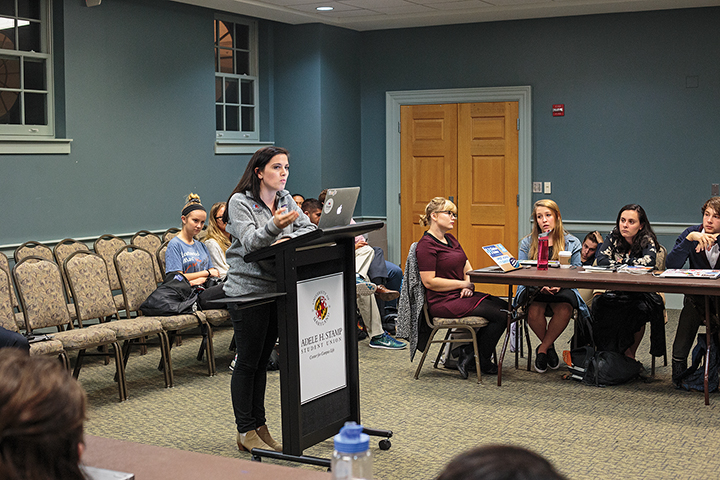When SGA President Katherine Swanson served as the SGA’s vice president of student affairs last spring, she noticed that some students were not able to participate in extracurricular activities as often as peers who came from more privileged backgrounds.
Finding a way to help students struggling financially would become a focus point during her campaign for Student Government Association president. And now, about one year later, Swanson’s vision — to fund student leaders who face financial burdens that interfere with their ability to make a difference in the student community — is in full motion.
SGA members are teaming up this month to raise money for the Student Leadership Grant, an SGA project that would enable student leaders who receive grant funds to spend less time working to pay for college and more time spearheading change on the campus. A team of 14 members from various sectors of the SGA is serving on the Student Leadership Grant Task Force to advocate for the funds.
[READ MORE: UMD’s SGA plans to crack down on student group funding appeals]
The group has raised about $150 since the campaign started Wednesday through Launch UMD, a university-owned crowd-funding platform. The SGA set a goal to raise $5,000 by March 31.
“We felt that $5,000 was a reasonable amount to raise in 30 days to be able to give at least couple of students a scholarship,” said Swanson, a senior government and politics major. The funding for the grants will be based on external donations.
Swanson defined a student leader as someone stepping out of the classroom and getting involved on the campus.
“It’s not just presidents of clubs, but also members of clubs doing hard work to make change on campus,” Swanson said.
Brandon Carroll, a junior information science major, works about 28 hours a week in addition to both attending City Council meetings and SGA meetings as deputy city affairs director for the SGA.
“Being able to receive a scholarship would take that hard work that I have to do 28 hours a week and reduce it so I can give more time into my studies and extracurriculars,” Carroll said.
For funding support, the SGA is looking to local University of Maryland alumni group members and former SGA members — many of whom were leaders of student groups on this campus, Swanson said. She has also been working with the University of Michigan’s student body president in an effort to model this grant after a similar project, the Leadership Engagement Scholarship, the Big Ten peer created last year.
The SGA often looks up to Big Ten peers when starting new initiatives, said Nisha Desai, a junior English language and literature major, the SGA’s director of communications and a task force member. Students at both universities created the projects in an effort to eliminate financial barriers for student leaders.
[READ MORE: UMD gives grants to address bias and identity issues, but they aren’t being used]
There are seven donation levels on the group’s Launch UMD page, ranging from $10 to $450. Each value represents common items college students need to purchase, such as food, school supplies, Metro fare, interview-appropriate attire, textbooks and various mandatory student fees. While the SGA has recommended donation amounts, the group recognizes that every dollar counts, Swanson said. The Launch UMD page allows donors to input custom amounts.
“I’ve had a lot of conversation with members of the task force and other students, and they were able to speak to their experience as to what they would need money for,” Swanson said.
The SGA is composed of students that have generally busy schedules like many other student-group participants at UMD, Desai said, adding that, “We want to find a solution for those students.”
Fasika Delessa, SGA vice president of academic affairs and a junior management major, said she joined the leadership grant task force in support of Swanson’s vision.
“We have these potentially great student leaders who aren’t given the opportunity because of the lack of funds,” Delessa said.



